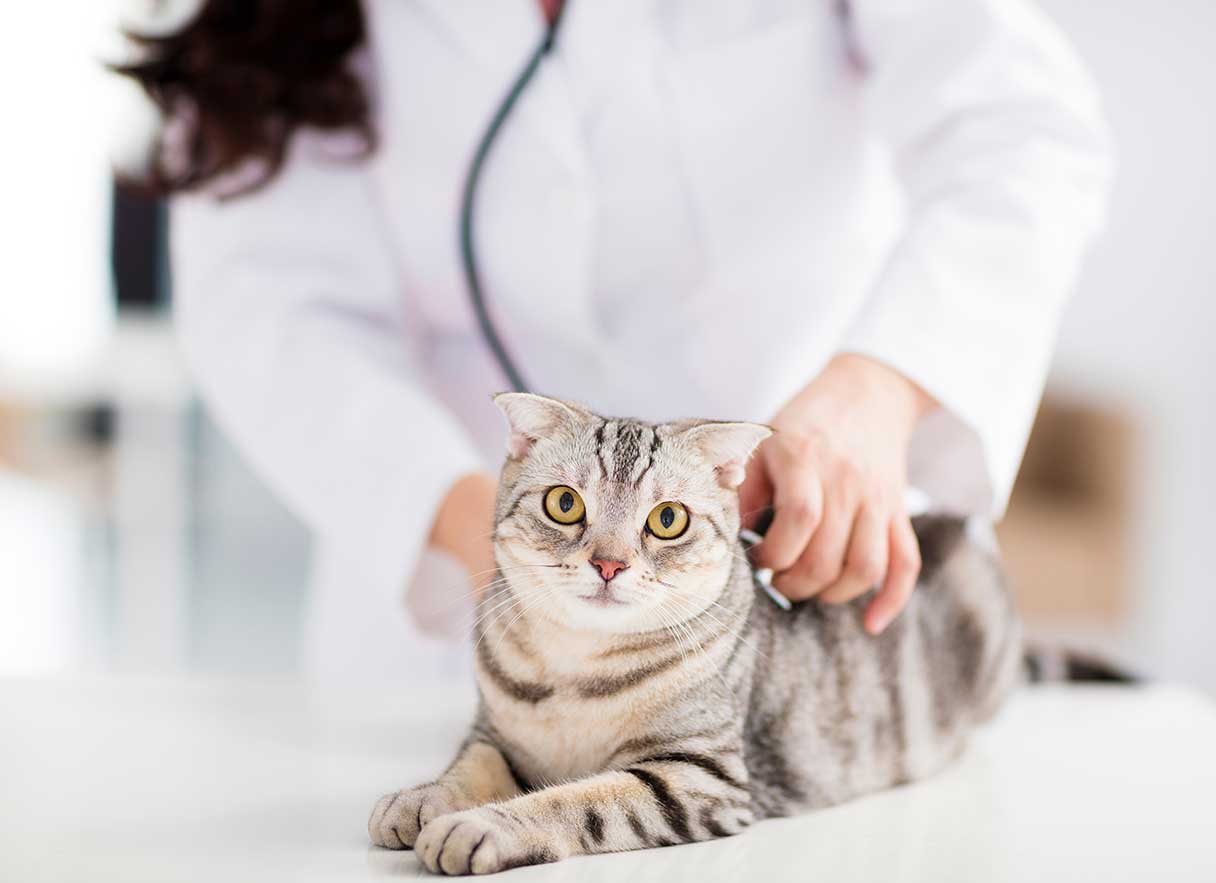Regular checkups for your pet are important to keep them healthy for life. Not only do routine visits establish baselines so your vet can note any changes to your pet's health, they can also screen for diseases, assess parasite risk and more.1
Here's what to expect when you take your furry friend in for a vet exam.
What Happens During a Vet Exam
Your pet's vet checkup will most likely begin by weighing them on a scale. The vet needs an accurate weight measurement to ensure the correct dosage of vaccines and medications. But they also want to see whether your pet is at a healthy weight.
Next, the vet will conduct a thorough nose-to-tail examination. Here's what they'll check:1
- Eyes. They'll check for unusual discharge, cataracts, signs of dry eyes, cherry eye, glaucoma and other potential issues.
- Ears. These will get checked for signs of infection or ear mites, as well as polyps or masses that need removal.
- Mouth. They'll examine the teeth to see whether your pet is due for a cleaning or dental checkup. Your vet will also check for mouth ulcers that could indicate cancer.
- Skin. Your vet will feel all over for lumps or bumps. They'll also examine the skin and fur for signs of allergies, infections, infestations, endocrine disorders or nutritional deficiencies.
- Belly. Palpitating the abdomen will help your vet detect abdominal masses and enlarged organs.
- Muscles, bones and joints. Besides observing how your pet moves and responds to touch, your vet will also feel along the joints for signs of inflammation, tenderness or swelling.
- Heart and lungs. Your vet will listen with a stethoscope for any abnormalities with your pet's heart rhythm or breathing.
While looking your pet over, they'll ask you about your pet's medical history, lifestyle and eating habits, as well as your own observations about their condition. This is a good time to ask questions or raise any concerns you have about your pet's health.
If the vet finds anything out of the ordinary, they'll most likely recommend a blood test, urinalysis or other diagnostic procedure. They may want to do an ultrasound or X-ray to check the vital organs. With senior pets, some or all of these diagnostic procedures might be part of their routine screening. If your vet discovers a health condition, they will discuss treatment options. Depending on the condition, they may recommend surgery or prescribe medication.
If it's time for a booster shot, your pet will also get brought up to date on their vaccinations. Pet vaccinations are broken down into core vaccines and non-core vaccines. Core vaccines are recommended for all dogs or cats, or, in the case of the rabies vaccination, are required by law. Non-core vaccines are recommended on a case-by-case basis, depending on your pet's level of risk. Your vet will discuss your pet's lifestyle and determine whether they should receive any non-core vaccinations.
Your vet will also assess your pet's risk of parasites and provide treatment as needed. Parasites include:
- Fleas, which can cause an allergic skin reaction. Large infestations can cause potentially fatal anemia, especially in puppies and kittens.2
- Ticks, which can spread serious diseases, including Lyme disease and Rocky Mountain spotted fever3
- Heartworms, which are transmitted through mosquito bites. Heartworms can cause irreversible damage to the heart and lungs if left untreated.4
- Internal parasites, including tapeworms, which are spread by fleas.2 Intestinal parasites can cause severe diarrhea, chronic fatigue and weight loss, along with other health problems.5
Your puppy or kitten will likely receive an oral dewormer on their visits. Older pets will be assessed for their risk of exposure to internal parasites, after which your vet may recommend either deworming medication or a fecal test to see if medication is needed.
If your pet hasn't yet started heartworm prevention medication or has gone more than six months without taking it, they'll need a blood test to check for heartworms before they can begin prevention medication.
Some medications combine heartworm prevention and flea and tick control in one, usually in the form of a pill or a medicated treat. Talk to your vet about your options for flea, tick and heartworm prevention. They can help match you with an effective method that fits both your lifestyle and your budget.
Your four-legged friend is family. Keeping regular vet visits promotes a long and healthy life for your pet, for years of smiles and happiness to come.
CareCredit Credit Card Financing for Vet Exams
Taking good care of your pet's well-being from nose to tail is essential. Make sure to stay up to date on their regular checkups at the vet to help keep your pet happy and healthy for a lifetime of love. You can use your CareCredit credit card for pet care throughout the year for routine veterinary services as well as emergencies and surgeries.* Apply today and use our Acceptance Locator to find a veterinarian near you that accepts CareCredit.
CareCredit is there for you and your pet every step of the way; continue your wellness journey by downloading the CareCredit Mobile App to manage your account, find a provider on the go, and easily access the Well U hub for more great articles, podcasts, and videos.
Author Bio
Jean Marie Bauhaus is a freelance writer and novelist with eight years of experience. Her work has appeared on Hill's Pet, Chewy and AKC.org, and more.








